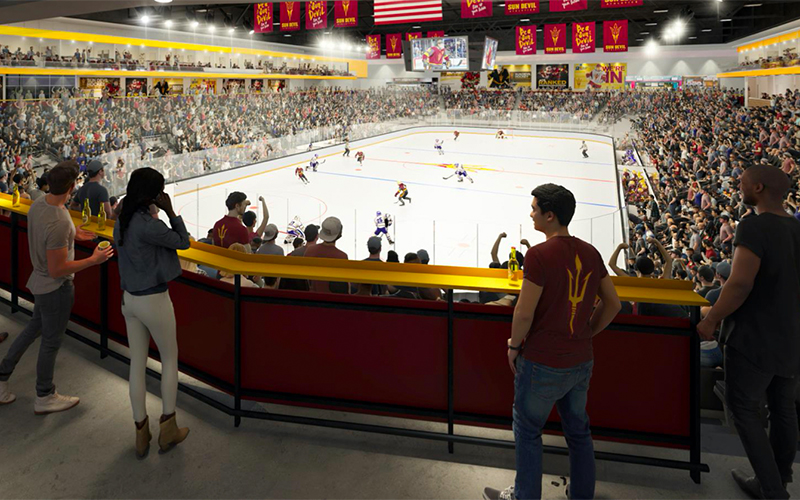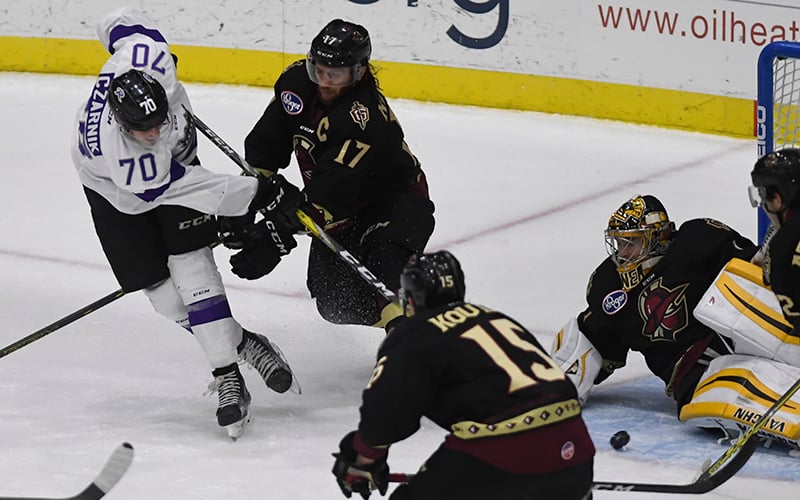
Fewer seats at Mullett Arena in Tempe means higher prices for Coyotes season-ticket holders next season. (Rendition courtesy of Arizona Coyotes)
PHOENIX – The Arizona Coyotes’ move from Glendale to Arizona State’s new Mullett Arena in Tempe for the 2022-23 season is causing mixed feelings for the team’s fans.
The Coyotes are moving from an NHL-sized venue at Gila River Arena, which has a seating capacity of 17,125, to a college hockey rink, which lists an official capacity of just 5,025.
Every seat at Mullett will come with a “lower bowl” view in the 100-level section surrounding the perimeter of the rink. By comparison, the other 31 NHL teams have up to 300-level seating sections.
But the intimate setting comes with a cost.
The decrease in capacity means that the average price for Coyotes games at Mullett Arena will be $170, nearly doubling the average price of a ticket at Gila River Arena, which was $90.
Chris Hartweg of TeamMarketing.com analyzes a system called Fan Cost Index (FCI), and according to his website, “The FCI is comprised of the prices of four average-priced tickets, parking for one car, and the least expensive stadium-available pricing for: two draft beers, four soft drinks, four hot dogs, and two adjustable caps.”
For the 2021-22 analysis, the Toronto Maple Leafs had the NHL’s most expensive FCI ($697.75) and the Coyotes came in dead last ($314.70).
Although a complete FCI isn’t available yet for Mullett Arena, Hartweg said the increased ticket prices at the smaller venue is a potential boon for the organization. And the Coyotes have said that they expect to sell every ticket.
“If you’ve packed that place with 5,000 passionate people, you’re making more per seat than you were at the last place,” Hartweg said.
In an email to Cronkite News, Hartweg likened the Coyotes move to when the NFL Chargers initially moved from San Diego’s 70,560 seat Qualcomm Stadium to the 27,000-seat StubHub Center in Los Angeles. With far fewer “cheap seats” to sell, ticket prices increased by 115%, which shot the team’s FCI up by 90% from 2016 to 2017.
Hartweg projects the Coyotes will rise from last in FCI in 2022 to among the top 10 teams in the NHL for 2023.
“I think that from a business standpoint, this is pretty ideal for the organization,” he said. “To help maximize your revenues is important for the long-term financial health of the organization.”
Coyotes president and CEO Xavier A. Gutierrez told espn.com that he expects to sell out every home game at ASU, with revenue increasing by 50%.
However, some Coyotes fans are unhappy about the price that comes with the arena move.
Lloyd Lawrence, a 10-year season-ticket holder, decided not to renew his tickets at the new arena, even though he realized the team needed to move to Tempe. For him, it was simply too expensive.
“I understand it’s a small arena and that all of the seats are going to be fantastic,” Lawrence said. “I understand that the team is there to make money and sell seats, so I’m not bitter or anything like that. But a little disappointed that it is priced out of my range now.”
Lawrence had two season tickets at Gila River Arena in the lower 109 section. Those seats were in line with the visitors’ goal during the first period on the penalty box side of the arena. At Gila River Arena, Lawrence paid $40 a game – about $1,600 for an NHL season.
Lawrence said that, despite the higher cost to attend a game, playing in a centrally located arena will benefit the Coyotes and improve the fan experience.
“Mullett Arena happens to be on (ASU’s) campus, much like when the Cardinals were playing at Sun Devil Stadium,” Lawrence said. “I think they have an opportunity to grow the fan base, and the biggest part of that is being closer to a much larger section of their fan base, which is in the East Valley.”
Ryan Travis, has a different perspective. A Coyotes season-ticket holder of more than 20 years, Travis was always prepared to pay the extra price for tickets because of his love for the team.
“I knew it was going to be more expensive, but I was going to stick with the team, no matter what,” he said. “I just went to (New York’s) Madison Square Garden last year, and I paid $200 for a lower-level seat. So we’ve been spoiled for so long, paying so little. So, yeah, we are paying more than we’re used to, but it’s not necessarily way out of bounds in relation to the rest of the league.”
Travis is also thrilled that the Coyotes will now be playing in Tempe rather than in Glendale.
“Having to drive through the congestion of downtown was a deterrent to many people from attending,” Travis said. “Several times, I would try to give tickets to friends that lived in Mesa, Chandler, and Gilbert, and they would not take them because they said they didn’t want to battle rush hour traffic at 5 p.m.”
Travis acknowledges he was disappointed by the ticket price increase, but he understood why it was happening, and he renewed his season tickets. However, he won’t be inviting those friends from Mesa, Chandler and Gilbert anymore. He reduced the number of tickets from the four he had at Gila River Arena.
“Unfortunately, with the decrease in seats available and the increase in prices, I had to go back down to two seats,” Travis said. “I used to sit in the upper deck in Glendale, and now I’m two rows off the ice at ASU, which I think is going to be pretty cool.”
Other fans have had to find ways to work around the ticket price increase. Sharon Conover, a Coyotes season-ticket holder since 1996, sat in section 109 at Gila River Arena and paid $48 per game there.
In an exchange of messages via social media with a Cronkite News reporter, Conover said she couldn’t afford seats at Mullett that are comparable to what she had before. Seats similar to section 109 at Gila River are listed at $188 per game.
Like Travis, Conover’s love for the Coyotes trumped the increased ticket prices, so she renewed for the upcoming season. She now has seats in the corner of the arena with a price of $89 per seat.
“I’m the kind of fan that would go no matter where they are,” Conover said.
Despite the increased ticket pricing, the Coyotes and their long-term fans have reason to be excited about a fresh start in a new home as the 2022-23 season approaches.

